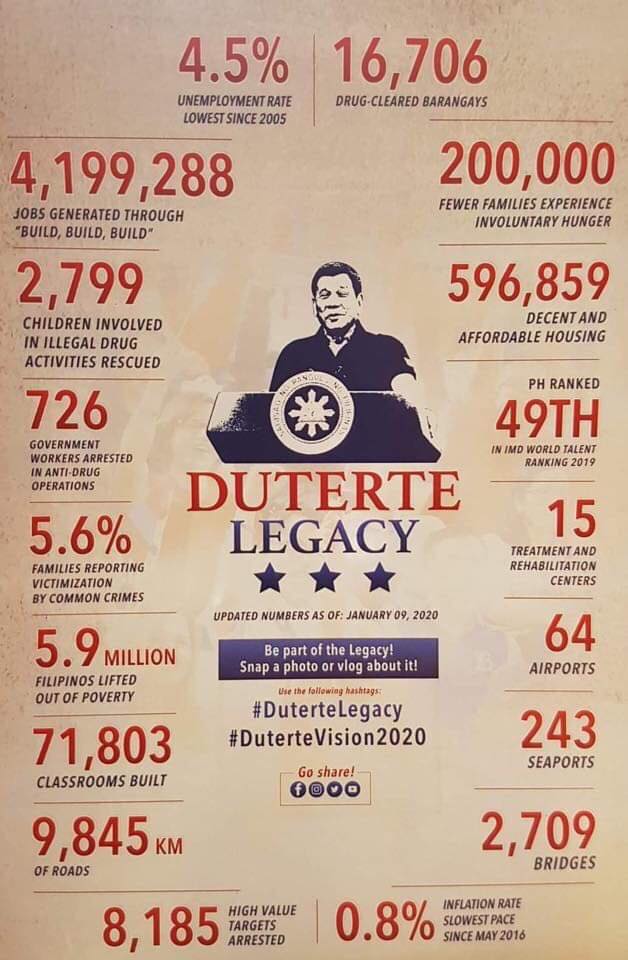Lifestyle
Duterte Legacy: Comfortable lives for all

DUTERTE LEGACY. The infographic highlights the achievements of the Duterte administration in the past three years.
President Rodrigo Duterte continues to deliver reforms changing the lives of Filipinos nationwide and overseas. (PCOO infographic via PNA)
MANILA — Three years after he took office, President Rodrigo Duterte continues to deliver reforms changing the lives of Filipinos nationwide and overseas.
At the Duterte Legacy Launch on Friday in Pasay City, the Presidential Communications Operations Office (PCOO) highlighted the achievements of the Duterte administration which aims to provide a comfortable life for all.
Duterte Legacy is PCOO’s communication campaign showcasing how the lives of Filipinos were impacted by the programs and projects of the government.
“The campaign centers on the accomplishments of the key three pillars of the president’s legacy, which are peace and order, infrastructure and development, and poverty alleviation,” PCOO Secretary Martin Andanar said.
Peace and order
Focused on reducing the supply, demand, and harmful effects of illegal drugs, the Duterte administration took drugs away from the people through anti-drug operations and arrest of drug personalities.
To date, about 16,706 barangays were cleared of drugs, 2,799 children involved in illegal drug activities were rescued, 726 government workers were arrested and 433 dens and clandestine laboratories were dismantled during drug operations.
To help drug surrenderers change their lives and turn their backs against illegal drug activities, the government together with the Philippine Drug Enforcement Agency established 965 Balay Silangan Reformation Centers and 15 treatment and rehabilitation centers.
Balay Silangan Reformation Centers are holistic rehabilitation centers which aim to reform drug personalities to become self-sufficient and law-abiding citizens again.
Apart from issues on illegal drugs, the Duterte administration also focused on crime reduction by empowering the police and encouraging the public to report all sorts of crimes they encounter.
As of January 9, 2020, about 5.6 percent of Filipino families have reported victimization by common crimes and 8,185 high-value targets were arrested.
Infrastructure and development
Under the Build, Build, Build program, the national government has improved the country’s key infrastructures — bridges, roads, railways, urban mass transport, railways, airports, seaports and new and better cities.
The Department of Public Works and Highways was able to construct and rehabilitate around 9,845 kilometers of roads, 2,709 bridges, 4,536 flood mitigation structures, and 71,803 classrooms.
The program also generated 4,199,288 jobs and helped reduce the unemployment rate to 4.5 percent, the lowest rate since 2005.
Poverty alleviation
With the signing of the Magna Carta of the Poor or Republic Act No. 11291 on April 12, the national government has started area-based, sectoral and focused interventions to poverty alleviation so that poor Filipinos are empowered to meet the minimum basic needs.
On April 17, Duterte also signed an act institutionalizing the Pantawid Pamilyang Pilipino Program or Republic Act No. 11310 — the national poverty reduction strategy and human capital investment program that provides conditional cash transfer to poor households for a maximum period of seven years to improve the health, nutrition and education aspects of their lives.
These efforts resulted in 5.9 million Filipinos lifted out of poverty, about 200,000 fewer families experienced involuntary hunger and 596,859 decent and affordable housing have been provided to the poor.
Meanwhile, the inflation rate hit 0.8 percent which is its slowest pace since May 2016 and the Philippine peso became the 2nd strongest currency in Southeast Asia under the Duterte administration.
Confidence in Duterte leadership
The Pulse Asia Survey in the last quarter of 2019 revealed the Duterte administration received a satisfaction rating of 87 percent — showing that the public approves the president’s work ethics and performance.
Describing Duterte’s reforms as “game-changing”, Andanar said the administration would continue to provide government services to ensure that Filipinos lives become better and healthier.





















